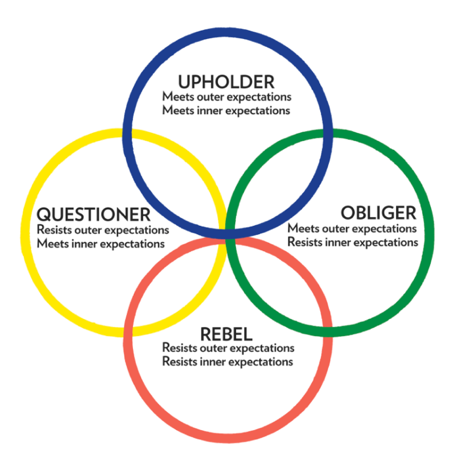I’ve been a fan of Gretchen Rubin for upwards of a decade. Once a law clerk for Sandra Day O’Connor, the best-selling author is most well-known for her original self-help book and accompanying blog, The Happiness Project. She’s since published four more titles surrounding notions of contentment, habits, and life optimization and now co-hosts the popular podcast, Happier with Gretchen Rubin.
While she’s not for everyone, Type As like myself can’t get enough. Her 2017 book, The Four Tendencies: The Indispensable Personality Profiles That Reveal How to Make Your Life Better (and Other People’s Lives Better, Too), presents readers with what I think is the most intriguing personality framework in a world of perhaps too many personality frameworks.
Her Framework
As Rubin tells it, people fall into one of four behavioral buckets (AKA tendencies): Obligers, Questioners, Upholders, and Rebels. Your tendency can tell you why you do things the way you do them, why you may have trouble understanding why people don’t do things your way, and why others behave the way they do.
You can take Rubin’s quiz to find out your tendency, but it can also be fun (and enlightening) to run through the nitty-gritty of each one first. Let’s dive in.

Obligers
Obligers tend to have no problem meeting outer expectations, and yet they typically struggle to do good on promises they make to themselves. For instance, an Obliger might always meet deadlines at work and come off as a dependable person to their boss and colleagues. However, when they attempt to tackle personal projects like organizing their home, they’re less likely to get the job done.
Obligers thrive when given clear directions or when others are depending on them. But without outer accountability, they often have a really hard time completing tasks.
The Obliger’s motto is, “You can count on me, and I’m counting on you to count on me.
Questioners
Questioners tend to question all outer expectations. They’ll meet obligations when they believe it makes sense to do so. In contrast to Obligers, all expectations must be turned into inner expectations in order for a Questioner to feel it’s worth their time and effort.
This type of person often takes issue with things they feel are arbitrary, like speed limits and New Year’s resolutions, wanting to know the reason behind all metrics and traditions. They can also struggle with “analysis paralysis,” spending substantial time analyzing a situation and eventually doing nothing or being unable to make a choice.
A Questioner’s strong suit is that they’re typically willing to seek out efficient solutions for everyday problems. On the other hand, a penchant for researching everything and questioning all norms can be draining, crippling, and sometimes vexing to those around them.
The Questioner’s motto is, “I’ll comply—if you convince me why.
Rebels
Rebels tend to resist most outer and inner expectations. According to Rubin, they can do anything they want to do, but the trouble is finding something they actually find worthwhile.
Besides making it difficult to satisfy other people and often neglecting important projects, this can inhibit a person from finding personal success. However, Rebels are often great at thinking outside the box and can be laser-focused when motivated. They just need to remind themselves that everything they do is a choice, whether it was their idea or not, which can be empowering.
The Rebel’s motto is, “You can’t make me, and neither can I.”
Upholders
Then there are Upholders, who are generally good at meeting both outer and inner expectations. They typically follow through with their commitments to others and can successfully meet the personal goals they set for themselves.
Where Upholders struggle is when directions aren’t clear, when they aren’t sure what their next move should be, or when they can’t figure out what success would look like in any given situation. At the same time, they’re often self-motivated and usually don’t have trouble making up their minds.
The Upholder’s motto is, “Discipline is my freedom.”
Yep, Definitely an Upholder
Rubin says Obligers and Questioners account for the largest portion of people. Rebels and Upholders are both fringe groups, but Rebels make up the smallest portion of people.
As a Type A person—well, OK, maybe an A-minus—I knew I was an Upholder even before I took the quiz. Just like my girl Gretchen, I’m good with deadlines and expectations set by other people, and I can make myself do basically whatever I tell myself I’m going to do.
Of course, we Upholders aren’t without flaws. This tendency is clearly the most uptight (um, hi), and often has unrealistic expectations of other people. This rigidness can make it hard to delegate tasks or give others a chance to do things their way, on their own time.
Discipline might be my freedom, but understanding that not everyone operates like I do and remembering that things don’t always go as planned helps me remain flexible.
Why Any of this Matters
So, why does any of this matter? Rubin has been studying human nature for years, and she found herself fascinated by the question of why people do (or don’t) do certain things. The examples she often uses are New Year’s resolutions and exercising.
For a lot of people, New Year’s resolutions make sense. The opportunity arises once a year, and it feels like as good a time as any to vow to be a better version of yourself or kick a bad habit. As for exercising, it struck Rubin how some people who had no problem participating in team sports growing up have a very hard time committing to working out as an adult.
“I sensed that some hidden pattern explained it, but it took me a very long time to grasp it,” Rubin tells Forbes. “But finally, I realized that the crucial question is: How do you respond to expectations? Because we all face outer expectations (like a work deadline) and inner expectations (like a New Year’s resolution).”
Rebels and Questioners struggle with the idea that they should resolve to be better just because it’s January 1. They feel they don’t need a fresh calendar year to do something they want to do. Similarly, Obligers are often able to exercise when they know other people expect them to show up, but unlike Upholders, they struggle with self-motivation.
Dissecting a personality framework might seem like a dull or even useless activity, and yet I find the Four Tendencies to be exceedingly helpful in understanding myself and my loved ones. As Rubin said on her podcast, you can even use it to find out more about the behaviors of your favorite fictional characters. By pinpointing the inner-workings of the main characters on Game of Thrones, she claims she was able to figure out their next moves.



